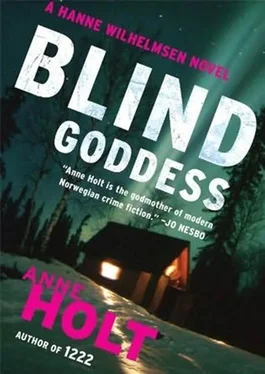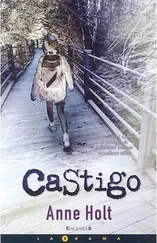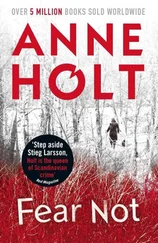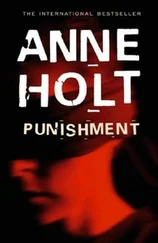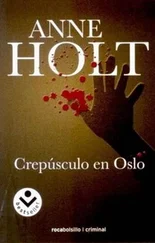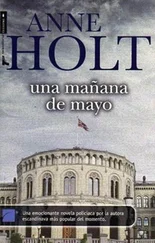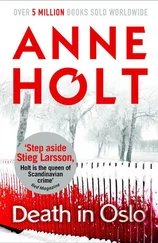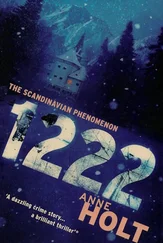The view of the majority, with some relief, was that there was no third man. Håkon himself didn’t know what to think. He was tempted to go along with the logical conclusions of his superiors. But Hanne Wilhelmsen demurred. She insisted there had to be a third man who had attacked her that fatal Sunday. It could not have been Lavik. Their superiors, however, disagreed: it was either Lavik, or perhaps an accomplice lower down the hierarchy. Anyway, they must not allow such an insignificant factor to disturb the neat solution they had found to the whole affair. They bought it, all of them. Except Hanne Wilhelmsen.
* * *
A strike. The third in a row. Unfortunately it was so early in the day that only one of the other lanes was in use. Four noisy young teenage boys were playing there, and they hadn’t so much as glanced over at the two older men since their initial critical and sneering appraisal. So there were no spectators to see this piece of bowling skill other than his opponent-and he pretended not to be impressed.
The screen suspended from the ceiling above their heads indicated that they’d both had a successful series. Anything over 150 points was quite good. Considering their age.
“Another game?”
Peter Strup was asking. Christian Bloch-Hansen hesitated for a moment. Then he shrugged his shoulders and grinned. Just one more.
“But let’s get some mineral water first.”
They sat there, each with a heavy ball in his hand, sharing a bottle. Peter Strup was running his hand over the smooth surface. He looked older and thinner than the last time they’d met. His fingers were dried up and emaciated, and the skin was cracked over his knuckles.
“Were you right, Peter?”
“Yes. Unfortunately.”
He stopped stroking the ball, put it down, and rested his elbows on his knees.
“I had such hopes for that young man,” he said, with a sad smile reminiscent of an ageing clown who’d carried on too long.
Christian Bloch-Hansen thought he could detect tears in his friend’s eyes. He patted him awkwardly on the back, and turned his gaze in embarrassment to the ten skittles standing rigidly to attention awaiting their fate. He could think of nothing to say.
“He wasn’t exactly like a son to me, but at one period we were very close. When he left my firm to set up on his own, I was disappointed-maybe hurt, too. But we kept in touch. If we could, we had lunch together every Thursday. It was pleasant, and rewarding. For both of us, I think. Over the last six months, though, the lunches became rather sporadic. He was abroad a lot. And didn’t give me such a high priority anyway, I suspect.”
Peter Strup straightened himself up in the uncomfortable little plastic chair, took a deep breath, and continued:
“I was stupid. I thought it was a woman. When he got divorced the first time, I probably came over like a strict father. Lately when he started to withdraw, I assumed that his marriage was failing again and that he wanted to avoid my reproaches.”
“When did you start to realise that something was wrong? Really wrong, I mean.”
“I’m not quite sure. But towards the end of September I began to suspect that a member of the profession was up to something on the side. It all began when one of my clients broke down. A miserable wretch I’ve had for years. He burst into tears with a long tale of woe. It transpired that what he was most concerned about was to get me to take up the case of a friend of his, a young Dutchman, Han van der Kerch.”
“Was he the chap who committed suicide in prison? The one there was so much fuss about?”
“That’s right. You know yourself how some clients are always dragging their friends along to try to get help for them, too. Nothing unusual in that. But after whingeing on for ages he told me he knew there was at least one lawyer behind a drugs ring, virtually a gang. Or a mafia. I was thoroughly sceptical, but thought there was enough in it to warrant further investigation. So I tried initially to make contact with the Dutchman. Offered my services, but Karen Borg wouldn’t budge.”
He gave a short, dry laugh without a trace of amusement.
“That refusal almost cost her her life. Well, with no access to the main source, I had to approach it in a roundabout way. I felt like some tenth-rate American private eye at times. I’ve talked to people in the strangest places and at the oddest hours. Though, in a way, it’s also been quite stimulating.”
“But, Peter,” the other man said in a low voice, “why didn’t you go to the police?”
“The police?”
He looked at his companion as if he’d suggested a pre-prandial massacre.
“What on earth would I have gone to them with? I didn’t have anything tangible. In fact, I think the police and I have had that problem in common: we’ve had hunches and beliefs and assumptions, but we haven’t been able to prove a damn thing. Do you know when I first got any positive evidence of my growing suspicions about Jørgen?”
Bloch-Hansen gave a slight shake of his head.
“I put one of my sources physically in a corner, that is on a chair without a table in front of him. Then I stood right in front of him and stared him straight in the eyes. He was frightened. Not of me, but of a feeling of disquiet in the market that seemed to be affecting everyone. Then I went steadily through the names of a number of Oslo lawyers. When I got to Jørgen Ulf Lavik he was noticeably uneasy, averted his gaze, and asked for something to drink.”
The boisterous youths were going out. Three of them were laughing and grinning and tossing a jacket from one to another, while the fourth, the smallest, was cursing and groaning and trying to intercept it. The two lawyers remained silent until the glass doors closed behind the lads.
“What did that give me? I could have gone to the police and told them that by using what was perhaps a somewhat amateurish lie detector I’d got a nineteen-year-old drug addict to reveal that Jørgen Lavik was a crook. Please go and arrest him for me. No, I had nothing to inform them of. Anyway, I’d begun to see fragments of the real truth even then. And it wasn’t something I could refer to a young attorney on the second floor of police headquarters. I paid a call instead on my old friends in the Intelligence Services. The picture we managed to piece together by our joint efforts wasn’t a pretty one. To be more precise, it was ugly. Bloody ugly.”
“How did they take it?”
“Naturally enough it stirred things up. I don’t think it’s settled down yet. The worst of it is that they can’t touch Harry Lime.”
“Harry Lime?”
“ The Third Man. You must remember the film. They’ve got enough on the old man to make things hot for him, but they don’t dare. It would get a bit too warm for them, too.”
“But are they letting him continue in post?”
“They’ve tried to persuade him to retire. They’ll keep on trying. He’s had heart problems, fairly severe ones. There wouldn’t be anything surprising about his retirement on health grounds. But you know our former colleague-he won’t give up until he drops dead. He sees no reason to.”
“Has his boss been told?”
“What do you think?”
“No, probably not.”
“Even the prime minister has been left in ignorance. It’s too horrific. And the police will never succeed in apprehending him; they don’t even have the remotest suspicion.”
The last frame went badly. To his annoyance Peter Strup saw his friend beat him by almost forty points. He must really be getting past it.
* * *
“Answer me one thing, Håkon.”
“Wait a minute.”
It was difficult getting his stiff leg into the car. He gave up after three attempts, and asked Hanne to slide the seat back to its full extent. That made it easier. He wedged the crutches in between the seat and the door. The heavy gate of the yard at the rear of police headquarters opened slowly and reluctantly, as if it wasn’t entirely sure whether it was advisable to let them out. At last it made up its mind: they could pass.
Читать дальше
